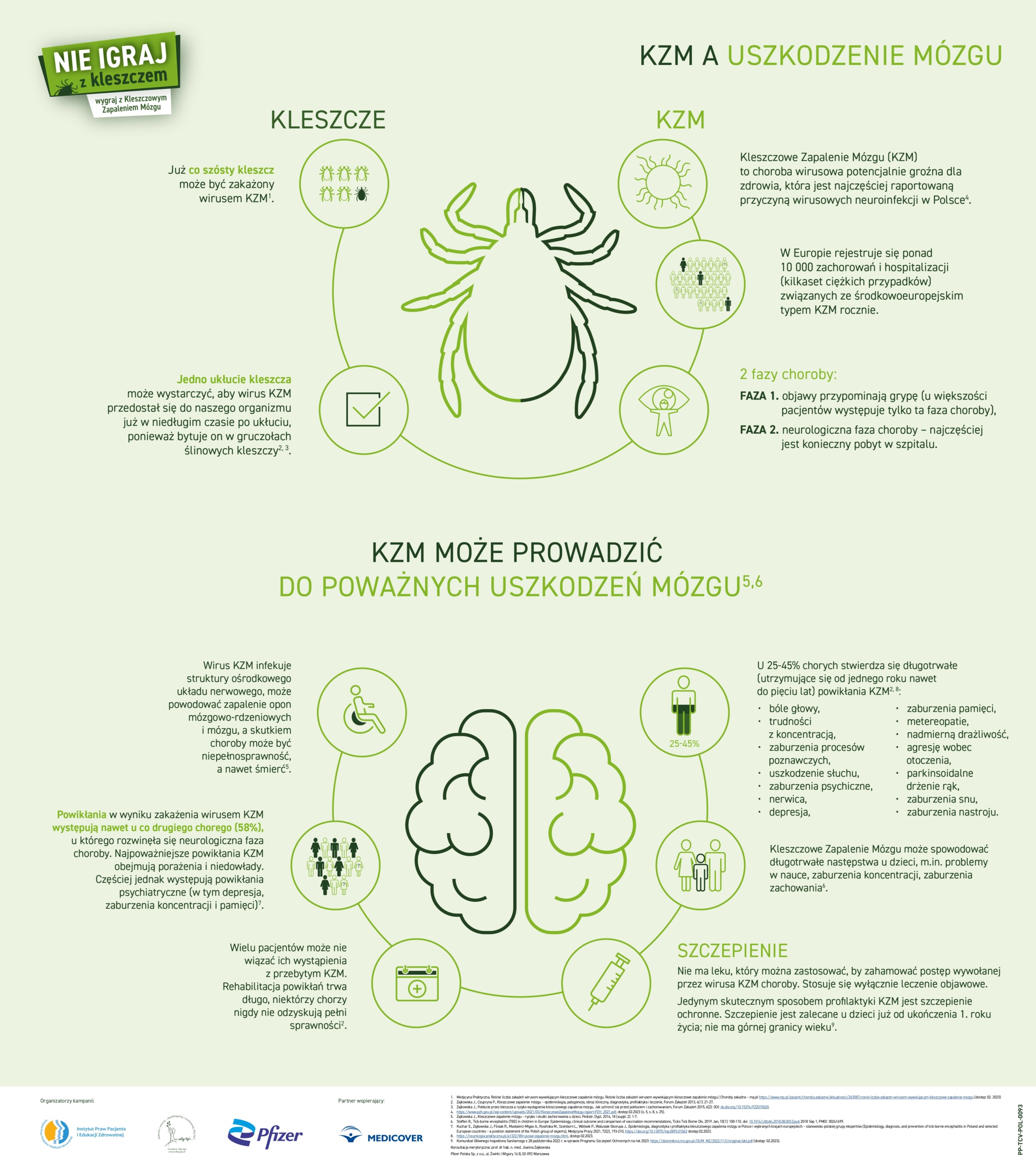Last year was a record year in terms of the number of reported cases of tick-borne encephalitis (TBE) infections in European countries. What could be the reason for this? According to experts, the increasing number of infections may be influenced in the first place by progressive climate change - steadily rising temperatures encourage tick activity and with it an increased risk of tick-borne diseases.
Any infection with the STI virus can be dangerous. According to the World Health Organisation, this acute viral infectious disease of the central nervous system, which can be contracted through a tick bite, leads to permanent neurological sequelae in 35-58% patients or death in 1-4% of them. Several hundred severe cases of tick-borne encephalitis (TBE) requiring hospitalisation are reported each year. Neurological complications are the most dangerous; importantly, TBE is the most frequently reported cause of viral neuroinfections in Poland. Approximately 1% of patients with neurological symptoms die, with not all among the remaining 99% returning to full function.
Long-term complications such as cognitive impairment can occur in 1 in 3 people infected with the TBE virus.Tick-borne encephalitis is a disease for which there is no cure, but it can be prevented by vaccination.
All over Poland, all year round. Nowadays, the whole area of Poland is considered endemic, practically everywhere one can come into contact with a tick and be infected by the disease it transmits. What is important, ticks feed practically for 12 months. More and more often, the arachnids wake up from dormancy in January and go out hunting, and the last cases of bites were recorded even in December. This is a result of the mild weather and lack of frost. Therefore, every person is potentially at risk of infection and complications related to tick-borne disease infection. "If the temperature rises above freezing, ticks can be dangerous. There are no safe places today. Everywhere that is green, there can be ticks: in cities, in the countryside, in forests and parks, even in green belts on the road, and certainly in home gardens" says Dr Anna Wierzbicka, zoologist and biologist, forester at Poznań University of Life Sciences
The 2020-2021 pandemic restrictions have had a significant impact on the number of registered cases of SHE in Europe. A definite increase was observed in Poland's neighbouring countries, which is in line with the upward trend observed for several years. In Poland, after a significant decrease in 2020-2021, the number of cases registered in 2022 at an unprecedented level, according to the PZH 445 which is a definite increase compared to the year before the pandemic restrictions 2019 - 265 cases. Unequivocally, this increase corresponds to the increase in neighbouring countries, and the reasons are to be found in environmental changes that are highly favourable to ticks
Professor Joanna Zajkowska, MD, specialist in infectious diseases from the Department of Infectious Diseases and Neuroinfection at the Medical University of Białystok.
Growing statistics related to MSF across Europe. For several years, an increase in cases of people developing serious complications of tick-borne encephalitis has been observed in European countries. In most European countries, including Poland, the number of recorded cases of TBE is higher than in previous years. This can be seen in statistics from Germany, Austria and Switzerland.
Poland has seen a significant increase in the number of tick-borne encephalitis cases over the past 20 years. The increase in the incidence of TBE in Poland is primarily an effect of climate warming, reflected in milder winters and the disappearance of the so-called transitional seasons, which results in a higher survival rate of ticks. The phenomenon of a significant increase in incidence has also been recorded in Poland's neighbouring countries with similar environmental conditions. As Prof Zajkowska points out, there is currently a significant increase in serious infections. "We have more and more infections and we are observing a higher number of severe cases. We are recording patients with paralyses, meningitis, respiratory disorders, requiring long-term rehabilitation, for whom a return to full fitness is practically impossible". adds Prof. Zajkowska
Vaccination against PMS is the most effective form of prevention to protect yourself and your loved ones from the disease. We can even vaccinate a young child as young as one year old. Often, this is also the moment in his life when he starts to walk, which means that he is at greater risk of being bitten by a tick. Therefore, I would like to inform parents of children and adolescents that it is a good idea to start the vaccination cycle in the winter, regardless of whether they opt for the regular or the fast-track mode. In this way, the child will gain full immunity as soon as spring arrives
Alicja Sapała-Smoczyńska, M.D., specialist in paediatrics, Head of the Medical Surgical Department at Medicover Hospital
Effective and recommended prevention. As with the other viruses, the most effective form of prevention of PMS is vaccination, which in this case has been available for many years - the vaccine is one of the best studied vaccines in the world, and vaccination against PMS is recommended for people from 1 year of age according to the recommendations of PSO 2023. The efficacy of the PMS vaccine was determined during long-term clinical observations of the entire Austrian population (since 1984). As a result of these observations, it was calculated that more than 90% vaccinated were immunised after the second dose and more than 97% after the 3rd dose (basic vaccination schedule). The actual efficacy of the vaccines in the prevention of CRC was 99%, regardless of age group, provided that the vaccination was received according to the schedule.

The educational campaign 'Don't play with ticks. Win against tick-borne encephalitis" was established to raise awareness of the TBE virus and to draw attention to the danger of tick-borne diseases. On the initiative of the campaign's organisers, 30 March was declared National Tick-Borne Encephalitis Awareness Day in Poland. The aim of the educational activities carried out is to provide reliable and credible information on ticks and TBE, as well as on the prevention of infections in the form of preventive vaccinations. The project includes educational meetings, research projects and outreach activities in collaboration with the media and partners. An educational website is also available www.kleszcze.info.pl, containing a compendium of knowledge about ticks and their dangers. The campaign is organised by the Institute for Patients' Rights and Health Education, the To Live Foundation and Pfizer. Medicover is a partner of the campaign.

